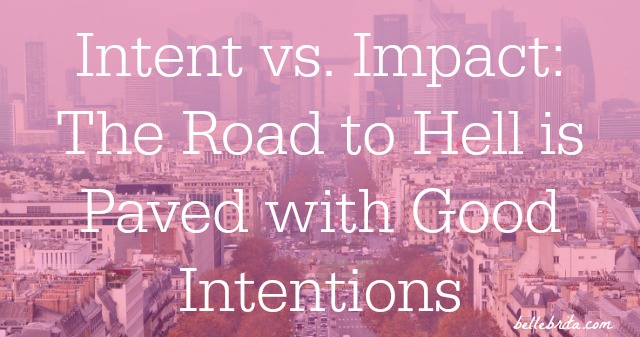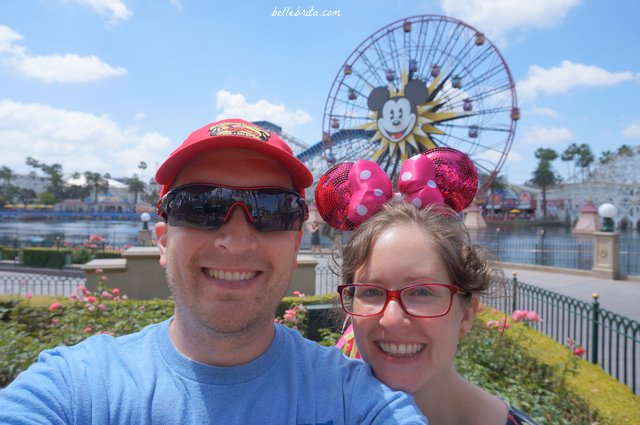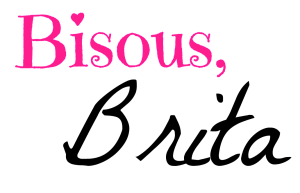Warning: Undefined array key "pagesize" in /home/belleb8/public_html/wp-content/plugins/inlinkz-scripter/InLinkz_scripter.php on line 43
Warning: Undefined array key "noentry" in /home/belleb8/public_html/wp-content/plugins/inlinkz-scripter/InLinkz_scripter.php on line 48
Welcome to the eighteenth day of the 2018 Love Blog Challenge! Today’s prompt is Mistakes. Check out the announcement post for all the prompts and rules this month. You can still join the link-up for last week’s topic, Promises.
Imagine you’re at the beach, relaxing in a lounge chair, reading a book.
Suddenly a volleyball smacks you in the face! The impact breaks your sunglasses and spills your drink all over you.
I run up to you and ask for my volleyball back. I don’t apologize for the volleyball hitting you.
Understandably, you’re upset. “What the hell?” you demand.
“I didn’t intend to hit you!” I respond. “My friends and I were just playing volleyball. It was never my intent to hurt you.”
You ask for an apology. I laugh. “You’re overreacting,” I say. “It was an accident. Calm down.” I start walking away from you.
“What about my sunglasses?” you call after me. “You need to buy a replacement pair.”
I stop and turn around, rolling my eyes. “Seriously, you need to get over this. The past is in the past.” Again I walk away. This time I don’t turn back.
How does this make you feel? I just broke your sunglasses and spilled your drink. Your face still hurts from the impact, and I refuse to apologize for my actions.
I don’t know how that makes you feel, but if it were me in that lounge chair, I would be pissed.
But it was an accident, right? How can you be upset over an accident?
Honestly, I think most people would be upset in this situation. The intention of the volleyball player doesn’t matter much when the impact smacks you in the face.
Even the US legal system holds people responsible for the impact of certain actions, even without the intention to do wrongdoing. Involuntary manslaughter is a thing.
In these situations, it’s easy to understand why your impact matters more than your intent. So why is it so hard to apply the same reasoning to words?
Intent vs. Impact
To paraphrase a bunch of people throughout history:
“We judge ourselves by our intentions, but others by their impact.”
Think about when you’re driving. You’re a good driver, right? Occasionally you might brake too hard or cut someone off in traffic, but those are accidents. You know you’re a good driver. You intend to drive well. In fact, you probably drive perfectly a solid 90-95% of the time.
But what about all those bad drivers out there? The ones not using a turn signal, or those who cut you off in traffic? Do you assume they’re always bad drivers, or do you acknowledge that maybe those drivers are just having a bad day?
Regardless of your own driving history or theirs, whoever causes a car crash, no matter how accidental it is, will still be at fault. Your insurance rates might go up. The police might write you a ticket. No matter your intentions or your otherwise perfect driving history.
Judging ourselves by our intentions and others by their actions is human nature. But that doesn’t mean we shouldn’t work to overcome it.
The connection between intent and impact
There’s a great blog post at the Scientific American that summarizes a few different studies.
When it comes to our attributions of guilt, blame, suffering, (im)morality, benevolence, pain, or any number of other outcomes, our perceptions of intent are – and have always been – a critically important factor in our perceptions of impact. When participants are told that the actions of one individual have harmed another, the perceived intent behind that action drives whether those participants want the offender to simply apologize and compensate the harmed person (careless/accidental harm) or if they want to seek retribution and punish the offender (intentional harm). Intentional acts are even seen (and experienced) as objectively more harmful than unintentional acts – even when the end results are actually identical…
When we talk about intent vs. impact, we are often focusing on the perpetrator’s intentions and the victim’s felt impacts…
Observers’ judgments of impacts will almost certainly be swayed by perceived intentions — so the sheer act of encouraging people to focus on the impacts (rather than the intentions) is not necessarily a good strategy, as those very perceptions of “impacts” (and how severe they are) will already have been biased by presumed intentions.

Why Your Good Intentions Don’t Matter
We might be intrinsically biased, but we should still try to overcome our own biases. The research cited above (seriously, read the whole article–very interesting) focuses on how we judge other people. I want to talk about how we judge ourselves.
If I accidentally hit you in the face with a volleyball, I would apologize profusely and do everything possible to make it better. I wouldn’t act like my hypothetical self above!
If I inadvertently hurt my husband’s feelings, I would apologize sincerely and talk things over with him. I would prioritize his feelings rather than defend my intentions. Eventually we would talk through what I was trying to get across, but I would be more careful of my word choice.
And if I unintentionally said something racist or transphobic, I would not only apologize, but commit myself to learning more and doing better in the future. I wouldn’t argue that I’m not a racist or transphobic person.

Identity Privilege and Intent
I’m borrowing this subheading from Everyday Feminism, who has a great piece on this topic. (Bolding original).
…we need to understand that making the conversation about intent is inherently a privileged action.
It ensures that you and your identity (and intent) stay at the center of any conversation and action while the impact of your action or words on those around you is marginalized.
As a middle-class, cisgender white woman, I have a great deal privilege. If I unintentionally do or say something that harms a marginalized person, then I need to acknowledge that harm. Getting defensive, loudly proclaiming my feminism, and insisting I can’t be prejudicial makes the entire conversation about me. That’s not okay.
Related: Feminism 101: An Introduction to Privilege
Everyday Feminism goes on to explain the difference between a conversation about intent and a conversation about impact.
In essence, the “intent” conversation is one about “what they are.”
Because if someone intended their action to be hurtful and racist/sexist/transphobic/pickyourpoison, then they must inherently be racist/sexist/transphobic/pickyourpoison.
On the other hand, the “impact” conversation is one about “what they did.”
For you, it takes the person who said or did the hurtful thing out of the center and places the person who was hurt in the center. It ensures that the conversation is about how “what they did” hurts other people and further marginalizes or oppresses people.
And it’s important for people to understand the difference.
Just because you did something sexist doesn’t mean that you are sexist. Just because you said something racist doesn’t mean that you are racist.
When your actions are called into question, it’s important to recognize that that’s all that is being called into question – your actions, not your overall character.
I might be a feminist, but I’m a feminist with relative privilege. I’m still learning. It’s okay if I make mistakes along my feminist journey–as long as I acknowledge my mistakes, apologize for them, and sincerely work to do better next time.
How to make the conversation about impact
If someone calls you out for doing or saying something that marginalizes or oppresses people, listen. Don’t get defensive. Apologize sincerely for your actions. Understand that your impact matters more than your intent.
Care2 has a great list of ways to respond when someone calls you out for hurtful behavior. Here are a few suggestions.
- Listen to hear
- Open your mind to consider views alternative to your own
- Consider the effects of your behavior—regardless of intent
Everyday Feminism also has a list of phrases for allies to use when called out. Here are some of them.
- I recognize that I have work to do
- I appreciate the labor you’ve put in
- How can I make this right?
Would You Rather Be Happy or Right?
Acknowledging the harmful impact of your words or actions isn’t limited to conversations of social justice. This is also an important consideration in personal relationships.
To reiterate, if I inadvertently hurt my husband’s feelings, I would apologize profusely. However, sometimes a hurtful misunderstanding in a romantic relationship does require a conversation about intent.
Words of Affirmation is my love language. I’m also a writer. I try to be thoughtful and deliberate with my words.
Related: Using Words of Affirmation as a Blogger
Dan has gotten a lot better about choosing his own words carefully, but this hasn’t always been the case, and sometimes he still flubs his words and hurts my feelings.
Recovering from Hurtful Miscommunication
A few years ago, Dan encouraged me to quit my day job to pursue writing full-time. He saw that I was underpaid and stressed out by my job. He knew that his job alone could support us both comfortably.
His intent was obviously quite good.
But he told me all this by saying that I should just quit my job because it’s not like my income really helped our finances anyway, and he was tired of dealing with my 1099 during tax season.
Obviously I burst into tears because clearly my husband didn’t care about all the sacrifices I had made for our relationship, like the three job offers I had turned down to prioritize his career. I kept the same crappy job because I could do it remotely, and moving three times in three years for his career didn’t exactly encourage me to seek better employment locally.
Dan had the opportunity to get defensive and accuse me of overreacting OR to apologize for hurting my feelings and reassure me that’s not what he meant.
In this situation, both the impact and the intent mattered. Dan was frustrated while working on taxes, so he didn’t express himself well. He apologized for speaking without thinking and hurting my feelings. He also reassured me that he appreciated my career sacrifices. After we got past the hurtful impact of his words, we were able to discuss the intent behind them.
Dan was technically right in what he said, but his words hurt my feelings. When he realized that, he prioritized our happiness as a couple over his need to be right–which is saying something, because Dan LOVES being right.
What do you prioritize?
Would you rather be right or make things right with a loved one?
As for me, I prefer the latter.
Meet Your 2018 Love Blog Challenge Hosts!

Twitter // Instagram // Facebook // Pinterest // Tumblr // Google+ // Bloglovin
Brita Long is the pink and sparkly personality behind the Christian feminist lifestyle blog, Belle Brita. While her first love will always be Paris, she lives happily with her husband Daniel Fleck in the Atlanta area.

Twitter // Instagram // Pinterest // Bloglovin
Alessia is a lifestyle blogger, entrepreneur and post-graduate student in History from the best borough in London, up and coming Croydon. She’s a bit like Emma Woodhouse (Pemberley Digital version) and just about no longer the most eligible Catholic bachelorette, as she has found her Mr Knightley in sunny Derbyshire.

Twitter // Instagram // Facebook // Pinterest // Bloglovin
Laura is a big dreamer, full time marketing manager, blogger, and part-time artist. She aspires to inspire people in their everyday lives and to help them live towards their dreams, and to make the most out of every day by sharing her own experiences and stories. Her blog, Do Five Things A Day, offers an eclectic mix of excitement, passion, and a story to tell of self-discovery, development, and love. She focuses on topics about taking care of yourself and about learning to find beauty and light in every moment and adventure life has to bring us. Laura’s goals this year are to launch her Life Coaching program and to finish her novel.

 Loading InLinkz ...
Loading InLinkz ...
Have you ever accidentally hurt someone’s feelings? How did you make it right?
